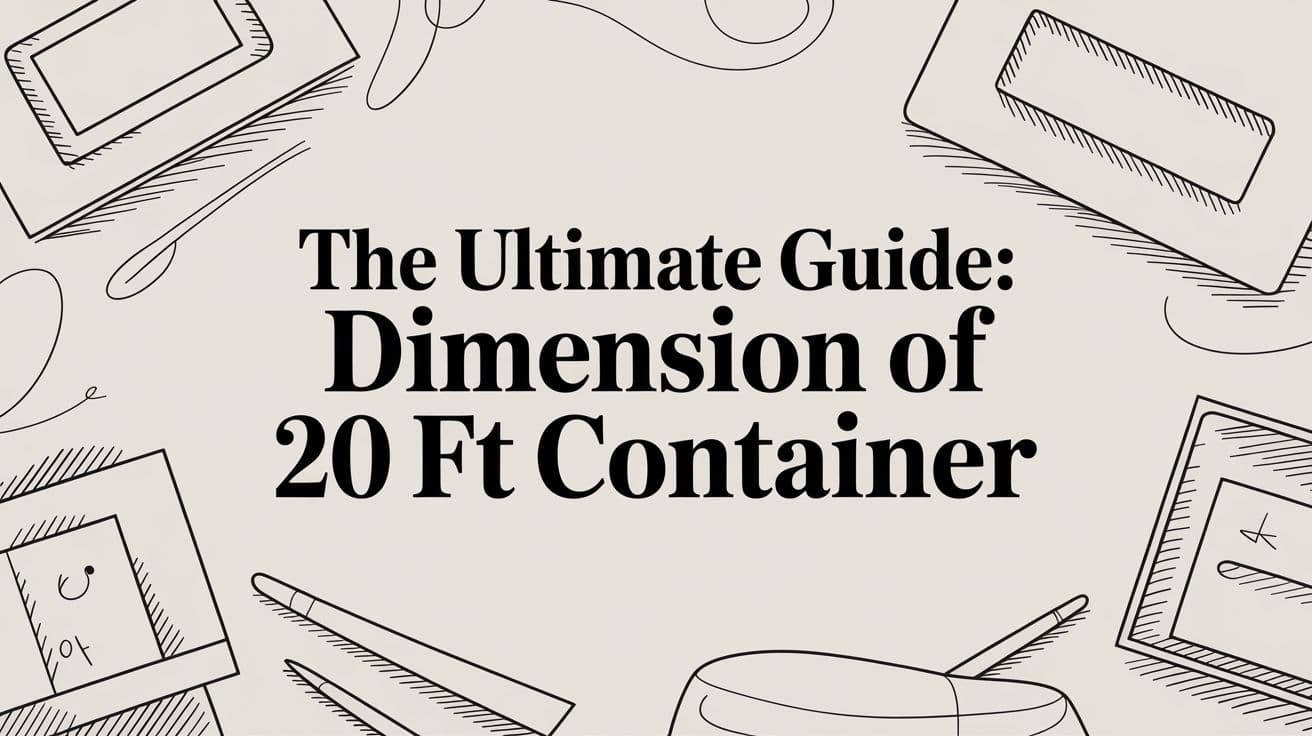When it comes to DDU (Delivered Duty Unpaid) and DDP (Delivered Duty Paid), the entire negotiation boils down to one critical question: who is responsible for the import duties, taxes, and customs clearance once the goods arrive?
With DDU, that final leg of the journey—and the associated costs—falls on you, the buyer. With DDP, the seller takes care of absolutely everything, delivering the goods to your door with all customs formalities and duties already paid.
Decoding DDU and DDP in Global Shipping
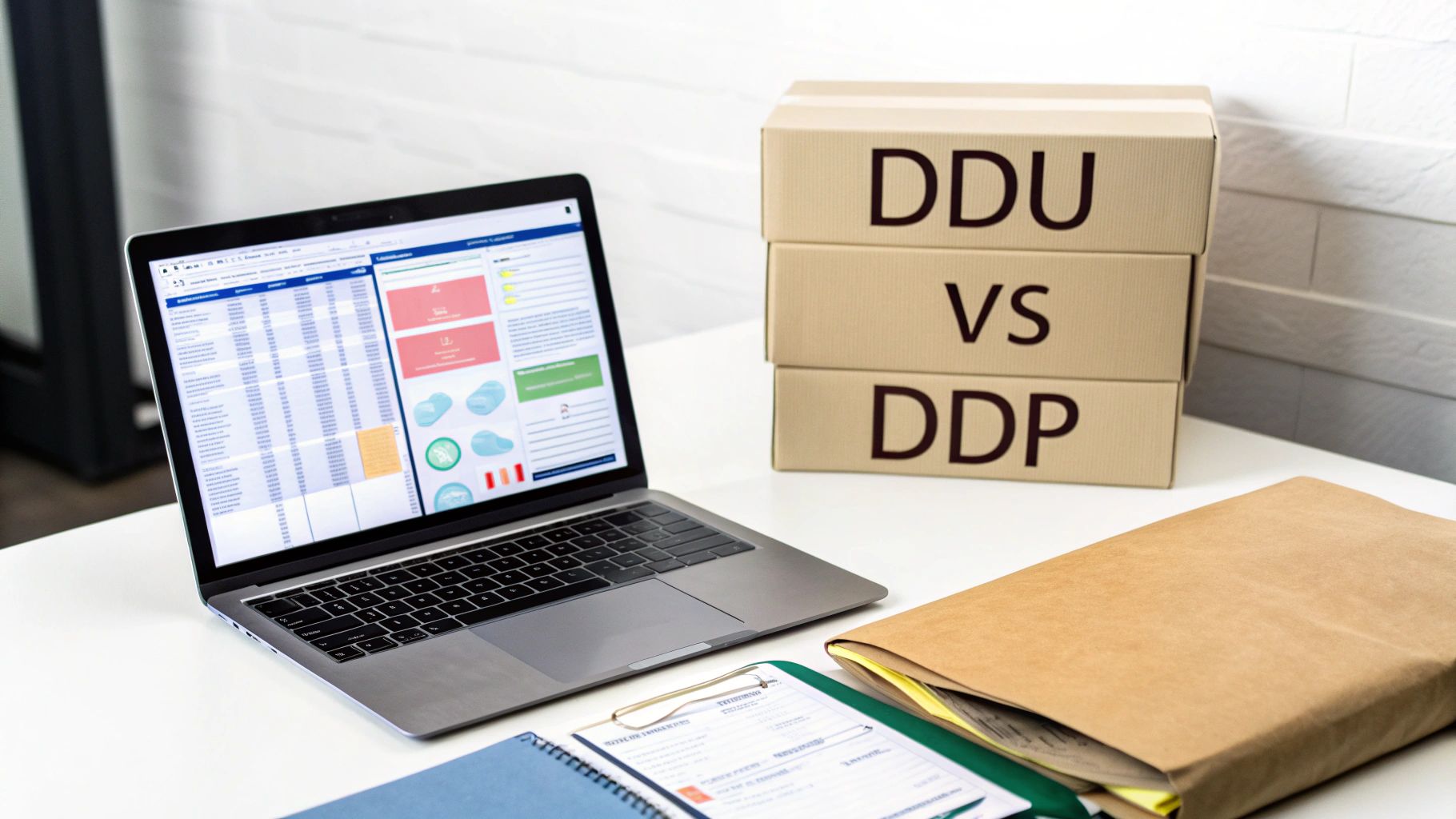
When you're importing from major hubs like China, the Incoterms in your contract are far more than just three-letter acronyms. They dictate the entire financial and logistical responsibility for your shipment. Getting the distinction between DDU and DDP right is fundamental to managing your budget, maintaining control over your supply chain, and preventing nasty surprises at the border.
Here’s a crucial point that often trips people up: the DDU Incoterm was officially removed by the International Chamber of Commerce (ICC) back in 2010. It was replaced with DAP (Delivered at Place). However, in the real world, the term DDU is still incredibly common, especially in agreements with Chinese suppliers. Because of this, you must clarify the exact responsibilities. DAP works almost identically to the old DDU, with the buyer handling all import clearance and duty payments.
To get a better sense of how these rules are changing, take a look at our guide on Incoterms 2025 explained.
Key Distinctions at a Glance
The decision between these terms directly shapes your total landed cost and how much hands-on work you'll need to do. The main differences between DDU (now officially DAP) and DDP hinge on:
- Cost Allocation: Who pays for the customs fees, duties, and taxes?
- Risk Transfer: When does the responsibility for the goods officially shift from seller to buyer?
- Operational Control: Which party is in the driver's seat for navigating the often-tricky import clearance process?
Here’s a quick breakdown to set the stage before we dive into the details.
| Feature | DDU (Delivered Duty Unpaid) / DAP | DDP (Delivered Duty Paid) |
|---|---|---|
| Primary Responsibility | Seller delivers to the destination, excluding duties/taxes. | Seller delivers to the destination, including all duties/taxes. |
| Import Customs | Buyer's responsibility. | Seller's responsibility. |
| Cost Predictability | Less predictable for the buyer due to variable customs fees. | Highly predictable for the buyer with an all-inclusive price. |
| Best For | Experienced importers with customs expertise. | Novice importers or those wanting maximum convenience. |
The choice between DDU and DDP is a strategic trade-off between control and convenience. DDU offers more control over final costs for experienced importers, while DDP provides a hassle-free, predictable landed cost for those prioritising simplicity.
Comparing Responsibilities: DDU vs. DDP
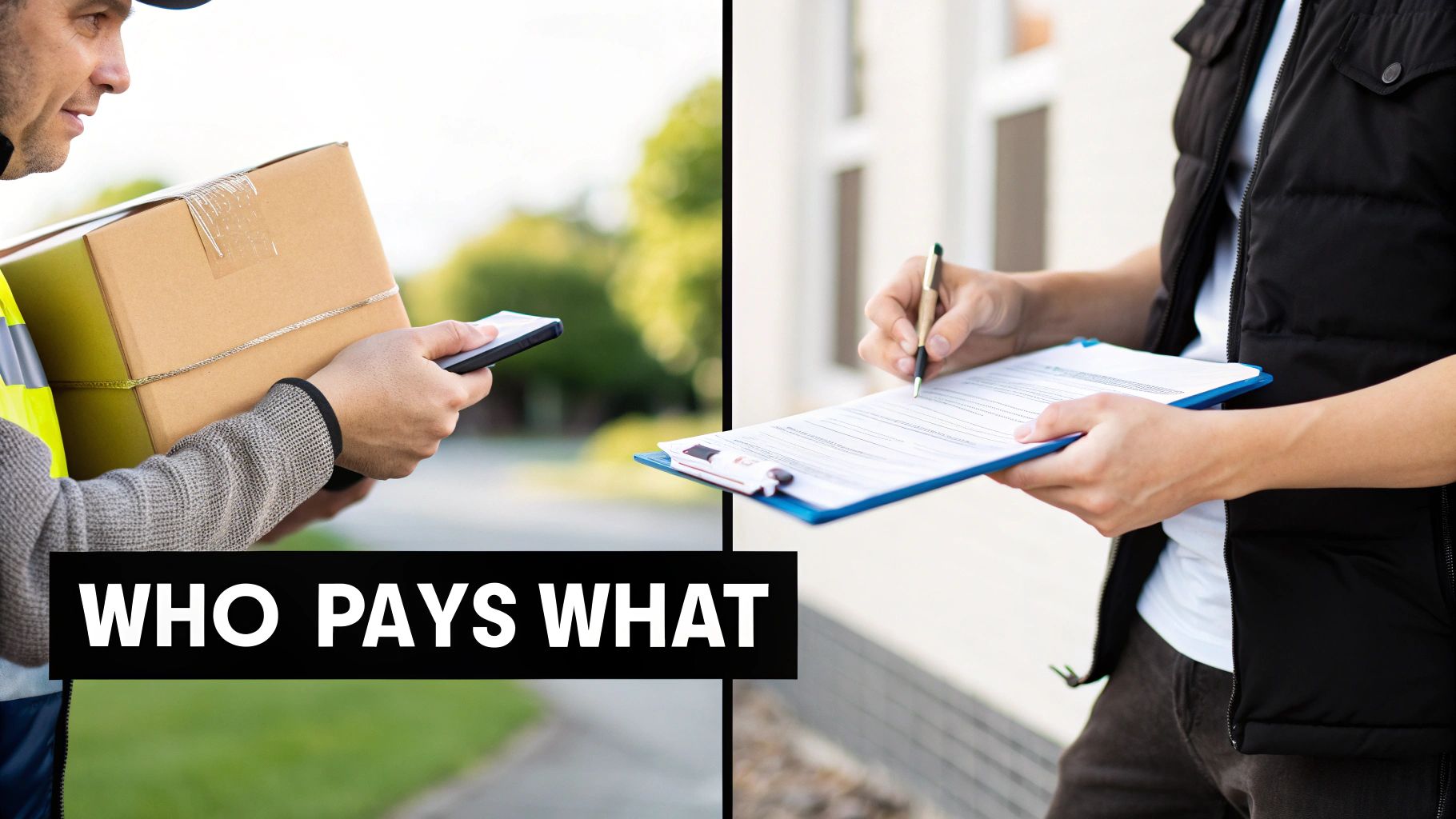
When you get down to it, the difference between DDU (now officially DAP) and DDP isn't just a technicality—it’s about drawing a clear line in the sand. You need to know exactly where your supplier's job ends and yours begins. The transfer of cost, risk, and control happens at completely different points, and that directly shapes your final landed cost and how much work you have to do.
Both terms see the seller getting your goods all the way to the destination country. The real split, the crucial point of divergence, happens right at your country's customs border. That single hand-off point determines who wrestles with the most complex, and often most expensive, part of the entire shipping journey.
The Critical Handoff Point: Customs Clearance
With a DDU agreement, the seller has done their part once the goods arrive at the agreed-upon destination, ready to be unloaded but before they’ve cleared customs. At that exact moment, the baton is passed. You, the buyer, are now fully responsible for the entire customs clearance process, including all duties and taxes. This gives you control, but it also means any paperwork errors or unexpected customs queries are your problem to solve.
DDP flips this completely. The seller handles everything, from start to finish. They don't just get the cargo to your country; they also navigate your local import rules, pay all the duties and taxes, and ensure the shipment gets cleared by customs. For the buyer, it's a completely hands-off experience.
The single most important difference between DDU (DAP) and DDP is who handles import customs clearance and pays the duties and taxes. Under DDU, it’s the buyer's headache. Under DDP, it's the seller's.
Responsibility Matrix DDU vs DDP Incoterms
To really get a feel for the differences between DDU DDP Incoterms, laying them out side-by-side is the best way to see where the responsibilities lie. The table below breaks down the key stages of a shipment, showing who's on the hook for what.
| Responsibility | DDU (Delivered Duty Unpaid) / DAP (Delivered at Place) | DDP (Delivered Duty Paid) |
|---|---|---|
| Export Formalities & Costs | Seller is responsible for all export licences and customs paperwork in the origin country. | Seller handles all export requirements and associated costs from the country of origin. |
| Main Transport (Freight) | Seller pays for and arranges the primary mode of transport (sea or air) to the destination. | Seller also pays for and organises the main international freight to the destination. |
| Insurance Obligation | Neither party is obligated to insure the goods, though it's highly recommended. Risk transfers at the destination before unloading. | Neither party is obligated, but the seller bears all risks until final delivery, making it essential for them to have coverage. |
| Import Customs Clearance | Buyer must manage all import procedures, paperwork, and communications with customs authorities. | Seller must handle all import customs formalities in the buyer's country, a significant responsibility. |
| Import Duties & Taxes | Buyer is responsible for paying all tariffs, VAT/GST, and any other import-related charges. | Seller pays all import duties, taxes, and any customs brokerage fees that are incurred. |
| Risk Transfer Point | Risk transfers from seller to buyer when goods arrive at the named destination, ready for unloading. | Risk transfers from seller to buyer only when goods are delivered to the final destination, cleared and ready for unloading. |
| Final Delivery | Seller arranges transport to the destination, but the buyer takes over for the final leg after customs. | Seller manages the entire door-to-door process, including the final last-mile delivery. |
As you can see, the contrast in workload and financial risk is stark. For a much deeper dive into the seller's end of the bargain, check out our comprehensive guide on delivery duty paid shipping, which unpacks the DDP term in full detail.
Ultimately, choosing DDU gives an experienced importer direct control over the customs process, letting them use their own trusted brokers to potentially save on costs. But be warned: any slip-up can lead to costly storage fees and delays. On the other hand, DDP offers total convenience and predictable costs, making it a go-to for new importers or anyone who wants a simple, fixed price for their shipment.
When to Use DDU or DDP in Practice
Choosing between DDU and DDP isn't just about ticking a box on a shipping form. It's a strategic decision that hinges on your business model, your level of import experience, and what you value most: control or convenience. Get it right, and you can smooth out your supply chain and protect your profit margins. Get it wrong, and you could be facing unexpected bills and logistical headaches.
The real question is, do you want to be hands-on with the import process, or do you prefer a simple, all-in-one price? Let's look at a couple of real-world scenarios to see how this plays out.
DDU: The Hands-On Approach for Savvy Importers
Imagine you’re running a business that's been importing electronics from China for years. You’ve got a go-to customs broker in your home country—someone who understands your products and has navigated customs on your behalf countless times. For you, a DDU (or its modern equivalent, DAP) shipment is almost always the smarter move.
Why? Because taking control often means cutting costs.
- You Use Your Own Team: You can work with your trusted customs broker, who probably gives you better rates and service than a random agent appointed by your seller.
- You See Every Cost: You pay the duties and taxes directly to your government. This transparency means you don't have to worry about the seller marking up these costs or burying hidden fees in a bundled DDP price.
- You Solve Problems Faster: If customs flags an issue—maybe a question on product valuation or a classification dispute—your local broker is right there to sort it out. Trying to get a seller on the other side of the world to handle these local, nuanced problems can lead to frustrating and costly delays.
By managing the final leg of the import yourself under DDU, you keep a firm grip on the most unpredictable part of the journey, which often translates to lower overall costs.
DDP: The Simple Solution for New and Growing Businesses
Now, let's picture a new e-commerce brand sourcing its first container of apparel from China. The founder is juggling marketing, web design, and customer service; they simply don't have the time or expertise to become a logistics expert. They need one clear, fixed cost to price their products accurately. For them, DDP is a game-changer.
The beauty of DDP is its sheer simplicity. It’s an all-inclusive, hands-off solution.
DDP is essentially a 'plug-and-play' logistics option. The price you're quoted is the final price to get the goods to your door. It removes all the complexity of customs, duties, and taxes for buyers who need to focus their energy elsewhere.
This gives you total cost certainty right from the start. No surprise bills from customs will land on your desk weeks later. That kind of predictability is gold for a new business trying to manage its budget and protect its margins. The seller takes care of everything, from the factory in China to your warehouse, freeing you up to actually run your business.
In China’s export market, DDP is becoming increasingly popular as sellers look for a competitive edge. Since 2015, analysis of China-Europe trade routes shows DDP shipment volumes in high-value sectors have grown by 15-20% annually. Chinese exporters are using all-inclusive pricing to make buying from them as easy as possible. You can find more details on DDP and DDU shipping options on DHL.com.
Ultimately, the choice between ddu ddp incoterms comes down to a simple trade-off. DDU offers control and potential savings for the experienced importer, while DDP delivers predictability and peace of mind for those who value convenience above all else.
How to Choose the Right Incoterm for Your Shipment
Picking the right Incoterm isn't just about ticking a box; it's a strategic move. The choice you make has real consequences for your budget, your timeline, and the amount of risk you're willing to shoulder. There's no single "best" option here. The right Incoterm—whether it's DDU or DDP—really comes down to your company's operational savvy, your appetite for risk, and your overall import strategy.
Forget trying to find a one-size-fits-all answer. A better way to approach this is by asking yourself a few key questions. Your honest answers will point you directly to the Incoterm that best suits your shipment and protects your business interests.
Evaluating Your Control and Cost Priorities
First things first, you need to decide how much control you want over the final, critical leg of the journey. Are you looking for a single, predictable cost that covers everything, or are you willing to manage a few moving parts yourself to potentially lower the overall expense?
Think about these crucial points:
- How hands-on do I want to be with customs clearance? If you already have a great customs broker you trust and prefer to oversee the process to keep everything compliant and on budget, then DDU (now officially DAP) is your go-to. On the other hand, if you'd rather hand off that entire headache to someone else, DDP is the way to go.
- Is a fixed, all-in cost more important than potentially lower, but unpredictable, costs? DDP gives you that peace of mind. The price you see is the price you pay. DDU, however, can sometimes work out cheaper if you can handle customs duties and fees more efficiently than the seller, but you have to be ready for potential surprises.
- How well does my team know our country's import regulations? If you're a seasoned importer who knows the ins and outs of local customs, navigating a DDU shipment will be straightforward. But if you're new to the game, the learning curve can be steep and expensive. In that case, the simplicity of DDP is a much safer bet.
This decision tree infographic helps visualise how your level of experience can guide your choice between DDU and DDP incoterms.
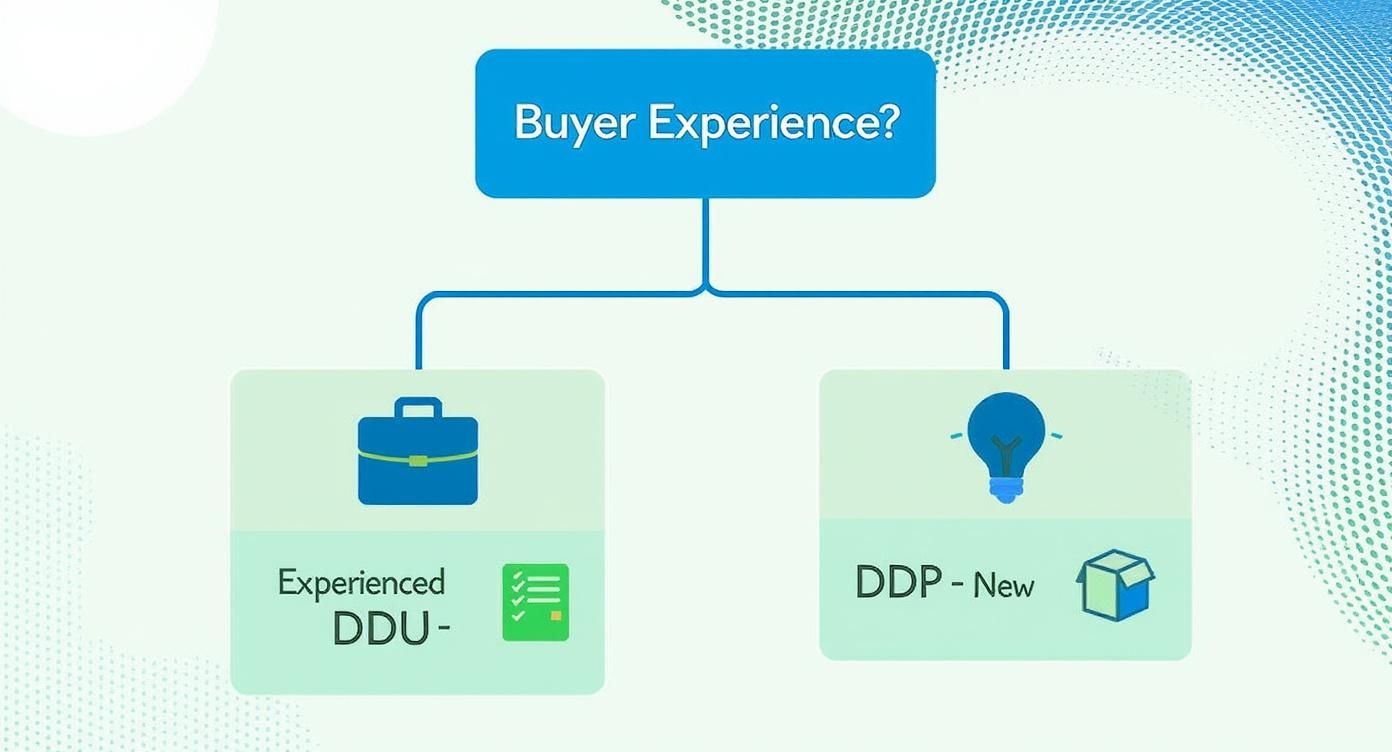
As you can see, experienced buyers often lean towards DDU because it gives them more control. New importers, however, usually find the convenience and predictability of DDP more appealing.
A Practical Decision Checklist
To help you decide with confidence, run through this checklist. It will force you to think through the real-world implications of both ddu ddp incoterms and see which one truly fits your business.
| Question | If Your Answer is "Yes"... | If Your Answer is "No"... |
|---|---|---|
| Do I have an established relationship with a reliable customs broker? | DDU/DAP is a strong option. | DDP is likely a safer choice. |
| Is my top priority a single, all-inclusive price with no surprises? | DDP is the ideal solution. | DDU/DAP may offer cost savings. |
| Am I comfortable managing and paying for import duties and taxes directly? | DDU/DAP aligns with this. | DDP removes this responsibility. |
| Am I shipping high-value or complex goods that may face customs scrutiny? | DDU/DAP gives you direct control to resolve issues. | DDP relies on your seller's expertise. |
Ultimately, the decision comes down to a trade-off. DDU offers transparency and control at the cost of requiring your active involvement. DDP provides ultimate convenience and predictability but places your shipment's final, critical stages entirely in your seller's hands.
By working through these questions, you can move beyond textbook definitions and make a smart, practical choice that serves your business best.
Avoiding Common Pitfalls with DDU and DDP
Choosing between DDU and DDP isn't just about who foots the bill for shipping. It's about understanding the hidden traps that can derail your supply chain and blow up your budget. Both terms come with their own set of headaches, and knowing what to watch out for is the best way to keep your shipments moving smoothly.
The Hidden Dangers of DDU Shipments
With DDU (or its modern equivalent, DAP), the biggest mistake is underestimating the final, landed cost. A buyer sees an attractive initial quote and jumps on it, only to get slammed with import duties, taxes, and brokerage fees far higher than they ever expected. It’s a classic way to see your profit margins vanish overnight.
Customs delays are another huge risk. As the buyer, clearance is your problem, but you're completely dependent on the seller providing accurate and timely paperwork. If that commercial invoice or packing list is wrong, your goods aren't going anywhere. They'll just sit at the port, racking up expensive demurrage and storage fees while you try to sort out the mess.
The core challenge with DDU is that responsibility shifts to you at a critical—and often chaotic—moment: when the goods hit your country's border. This is precisely where small mistakes can snowball into massive expenses.
To get ahead of these problems, you need to be proactive:
- Pre-Calculate Duties and Taxes: Don't just take the seller's word for it. Before you agree to DDU terms, use a duty calculator or, even better, talk to a customs broker. Get a realistic estimate of all import costs so you know exactly what you're in for.
- Vet Seller Documentation: Make it a non-negotiable part of your process. Insist on seeing drafts of all shipping documents before the cargo leaves the origin port. Check that the product descriptions, HS codes, and values are spot-on to avoid red flags with customs.
- Engage a Broker Early: Don’t wait until the ship is docking to find a customs broker. Have your expert lined up and ready to go. They can ensure a much smoother clearance and help you navigate any unexpected hurdles without delay.
Navigating the Risks of DDP Agreements
DDP might seem like the easy, hassle-free option, but it comes with its own set of risks, mainly centred around a lack of control and transparency. The biggest pitfall is the bundled, opaque pricing. Sellers often pad the total cost to cover their own risk, meaning you could be overpaying for shipping, duties, and fees without ever knowing it.
On top of that, you surrender all control over the logistics. If your seller opts for a cut-rate, unreliable carrier or simply doesn't understand your country’s specific import regulations, your shipment could face serious delays or compliance problems. And the worst part? You’ll have almost no power to fix it directly.
A DDP agreement places immense trust in your seller's logistical competence. If they are not experts in your country's customs procedures, their 'all-inclusive' service can quickly become a source of delays and frustration that you have little power to influence.
To effectively avoid these pitfalls, it is essential to systematically assess the contractual implications, much like utilising a comprehensive contract review checklist to protect your business.
This is especially true when importing from China. While many Chinese suppliers now offer DDP, you need to be careful. Statistics show that while about 70% of China’s exports in 2023 were on FOB terms, DDP adoption is climbing. In sectors like consumer electronics, it’s estimated to be 25-30% in 2024. This shift is driven by buyers who want simplicity, but it highlights the growing need for diligence.
The best way to protect yourself on a DDP shipment is to demand an itemised quote. Ask the seller to break down the costs for freight, insurance, duties, and local handling. This level of transparency helps you spot inflated charges and ensures you’re getting a fair deal for the convenience you're paying for.
Working With a Freight Forwarder for DDU and DDP
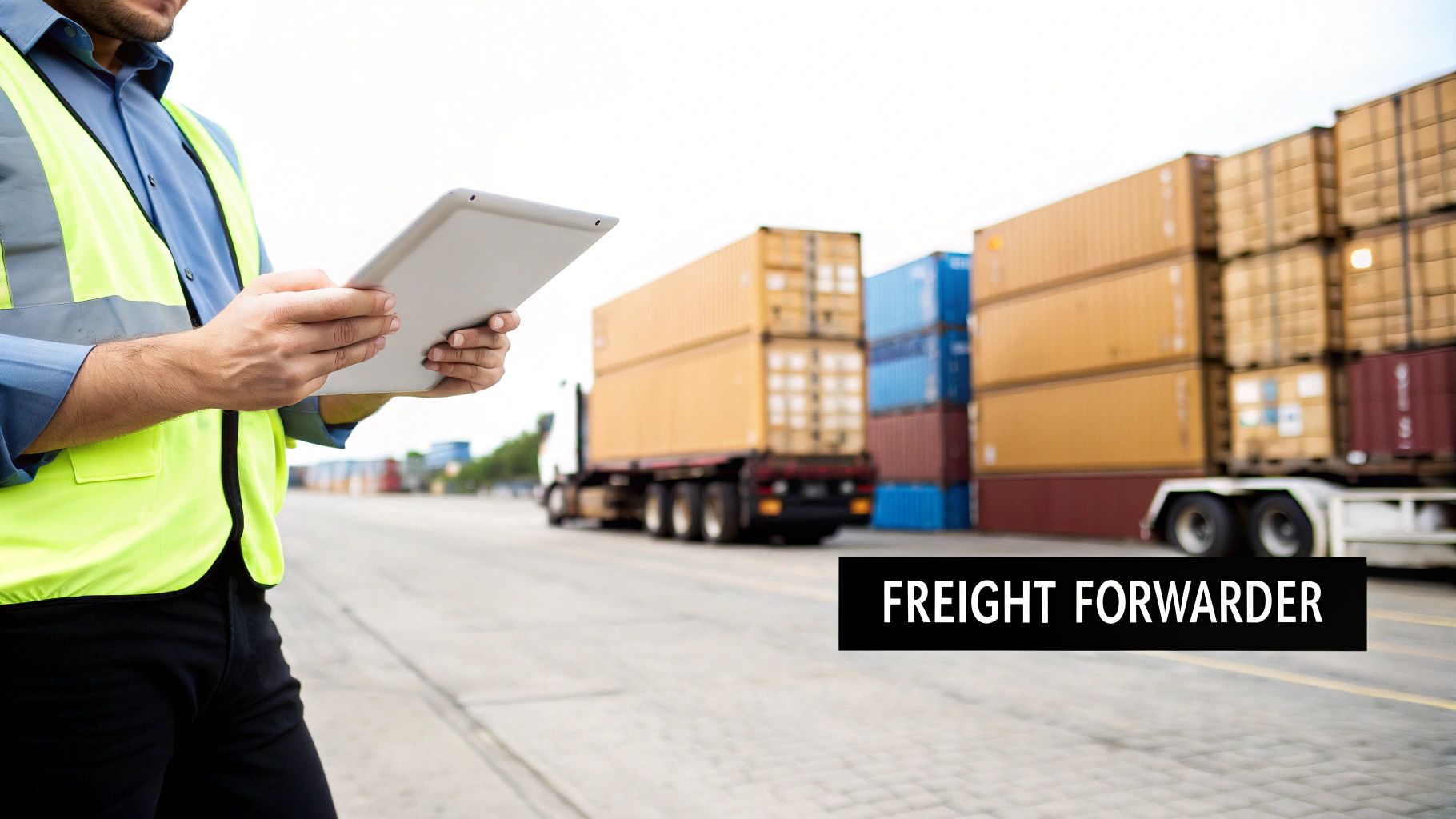
Whether you land on DDU or DDP, a good freight forwarder isn't just a vendor—they're your partner on the ground. Think of a company like Upfreights as the team that turns the theory of Incoterms into the reality of a smooth-running supply chain, protecting your shipment every step of the way.
The forwarder's job shifts quite a bit depending on the Incoterm you choose. They adapt to fill whatever logistical gaps you have, acting as your local representative to make sure your interests are always front and centre, whether you're tackling customs yourself or leaving it to the seller.
How a Forwarder Supports DDU Shipments
When you're working with DDU (now officially DAP), the baton is passed to you the moment your goods hit the destination country. This is precisely when a skilled freight forwarder proves their worth, stepping in to navigate the most difficult part of the import journey for you.
Essentially, your forwarder takes command of that final, critical leg. Their main jobs include:
- Acting as Your Customs Broker: They’ll prepare and file all the necessary import declarations, making sure every piece of paperwork is accurate and meets local customs regulations.
- Managing Duty and Tax Payments: Your forwarder will calculate what’s owed and handle the payment of all import duties and taxes, which is crucial for avoiding hold-ups.
- Coordinating Final Delivery: Once customs gives the green light, they arrange the final inland transport to get the goods from the port or airport straight to your warehouse.
With DDU, your freight forwarder becomes your operational arm. They take the complex, high-risk task of customs clearance off your plate, converting a potentially stressful process into a seamless final delivery.
By partnering with a forwarder like Upfreights, you get to keep control over the import process without getting bogged down in the granular, time-consuming details. You can see how we manage the intricacies of customs clearance to ensure goods arrive without a hitch. This hands-on approach helps sidestep expensive storage fees and frustrating delays.
Providing Oversight on DDP Shipments
While DDP might seem easy because the seller handles everything, it comes with its own major risk: a total lack of visibility and control. This is where an experienced freight forwarder can offer a crucial layer of oversight, even when you aren't directly in charge of the shipment.
Even on a DDP basis, a forwarder provides real value. They can be your eyes and ears, verifying that the seller is actually fulfilling their obligations correctly and that the process is moving along as it should.
Here's how they can help:
- Vetting the Seller’s Plan: A good forwarder can look at the seller's logistics plan and choice of carriers, spotting potential red flags like unreliable agents or inefficient routes that could cause delays.
- Providing Shipment Visibility: They have access to global tracking systems and can give you independent, real-time updates on your cargo’s location—something a seller might not be willing or able to provide.
- Ensuring Local Compliance: Your forwarder can double-check that the agent the seller appointed is handling local customs properly, shielding you from compliance headaches that could surface later.
At the end of the day, a freight forwarder ensures your interests are always the priority. They bring the expertise and on-the-ground execution needed to turn a complex international shipment into a predictable, managed process.
Common Questions About DDU & DDP Answered
Even with a side-by-side comparison, questions always pop up when it's time to sign a contract. Let's tackle some of the most common ones that importers, especially those sourcing from China, run into with DDU DDP Incoterms.
Is DDP always more expensive than DDU?
On paper, yes, a DDP quote will almost always look higher. That’s because the seller is rolling everything—the shipping, the insurance, customs clearance, and all taxes and duties—into one price. It's a single, all-in figure.
But that's not the whole story. With DDU, you're on the hook for all those import fees when the goods arrive. If you don't have a sharp customs broker or if you guess wrong on the duty rates, your final costs could easily balloon past what you would have paid for DDP.
Think of it this way: DDP gives you predictable, fixed costs. DDU offers a chance to save money, but only if you're confident you can manage the import process efficiently. The cheaper option isn't about the quote; it's about who can handle the final-mile costs better.
I thought DDU wasn't an official Incoterm anymore. Can I still use it?
You absolutely can, and this is a huge point to remember when dealing with suppliers in China. Officially, the International Chamber of Commerce (ICC) did replace DDU with DAP (Delivered at Place) back in 2010. But in the real world, "DDU" is still used all the time.
If your supplier’s contract says DDU, don't panic. Just get crystal clear on what they mean. In almost every case, it will operate just like DAP: they get the goods to a location you name, and you take it from there—customs, duties, taxes, the whole lot. Just make sure that's all spelled out in your agreement.
What happens if my supplier messes up the customs paperwork under DDP?
This is where DDP can get tricky. Because the seller is handling customs in your country, their mistakes can become your headache. If they fill out the forms wrong or misclassify the products, your shipment could get stuck, flagged for inspection, or even seized.
Technically, the seller is on the hook for any fines. But the delays? Those hit your business directly, and you're stuck on the sidelines with no power to fix it since you aren’t the official importer of record. This is exactly why you should only ever agree to DDP with suppliers you trust completely—ones who have a solid history of shipping to your country without issues.

